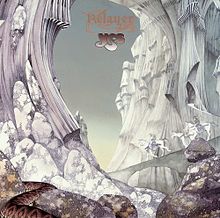به زبان فارسی
PICTORY
LATEST MUSIC
SEARCH
Soon
by Paykar13-May-2011
This fantastic composition is the ending of the Gates of Delirium (inspired by Tolstoy's war and peace) from the album Relayer.
Yes is a British progressive rock band known for its conceptual albums in the early years which emphasized spirituality( through lyrics that sometimes had no rhyme at all), at times depicting the battle between Good and Evil with masterful compositions. This song (Soon) is the aftermath of the epic cosmic battle, a prayer for peace.
The Gates of Delirium is 27 minutes long( The live version) It was released in 1974. This performance is on a DVD recorded in Netherlands in 2002.
Soon oh soon the light
Pass within and soothe the endless night
And wait here for you
Our reason to be here
Soon oh soon the time
All we move to gain will reach and calm
Our heart is open
Our reason to be here
Long ago, set into rhyme
Soon oh soon the light
Ours to shape for all time, ours the right
The sun will lead us
Our reason to be here
Soon oh soon the light
Ours to shape for all time, ours the right
The sun will lead us
Our reason to be here
| Recently by Paykar | Comments | Date |
|---|---|---|
| Supertramp | 7 | Jun 07, 2011 |
| Supper's Ready | 3 | Jun 05, 2011 |
| Crosby, Stills, Nash & Young | 6 | Jun 04, 2011 |
RECENT COMMENTS
IRANIANS OF THE DAY
| Person | About | Day |
|---|---|---|
| نسرین ستوده: زندانی روز | Dec 04 | |
| Saeed Malekpour: Prisoner of the day | Lawyer says death sentence suspended | Dec 03 |
| Majid Tavakoli: Prisoner of the day | Iterview with mother | Dec 02 |
| احسان نراقی: جامعه شناس و نویسنده ۱۳۰۵-۱۳۹۱ | Dec 02 | |
| Nasrin Sotoudeh: Prisoner of the day | 46 days on hunger strike | Dec 01 |
| Nasrin Sotoudeh: Graffiti | In Barcelona | Nov 30 |
| گوهر عشقی: مادر ستار بهشتی | Nov 30 | |
| Abdollah Momeni: Prisoner of the day | Activist denied leave and family visits for 1.5 years | Nov 30 |
| محمد کلالی: یکی از حمله کنندگان به سفارت ایران در برلین | Nov 29 | |
| Habibollah Golparipour: Prisoner of the day | Kurdish Activist on Death Row | Nov 28 |




Dear truthseeker9
by Paykar on Sat May 14, 2011 04:01 PM PDTThanks for the encouragement. I would like to do more from the progressive rock era and finish it with postmodern evolution of the genera.
I feel the works of contemporary Iranian masters are widely known, not presenting their works, I hope, is not viewed as disrespect on my part.
Let me know if you like more work from Banan, and by association those of Khaleghi, Rahi, and Mahjoobi.
All the best,
Amir
Dear Paykar
by Truthseeker9 on Sat May 14, 2011 02:54 PM PDTI'm enjoying all your music blogs, and the rest of your posts on IC. Thanks for your input.
Nice Music .. Thank you
by Soosan Khanoom on Sat May 14, 2011 01:13 AM PDT"Seize the moments of happiness, love and be loved! That is the only reality in the world, all else is folly".
Tolstoy